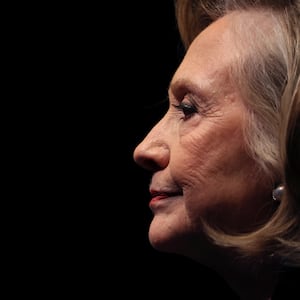When it came out last week that the Federal Election Commission fined Hillary Clinton’s presidential campaign and the Democratic National Committee for misreporting political payments in 2016 that funded the explosive Steele dossier, the news attracted plenty of media attention. The penalties themselves, however, had nothing to do with the actual content, creation, or distribution of that infamous document.
Instead, the FEC dinged the Democrats on a clerical issue. And the real loser might actually be Donald Trump.
By coincidence, the same day the Clinton news broke, a watchdog group sued the FEC for taking no action on its complaint alleging that Trump’s 2020 campaign committed the exact same clerical violation. In both cases, the campaigns allegedly reported payments to a pass-through that actually went to another entity, concealing the money’s true recipient and purpose from the public.
ADVERTISEMENT
But there’s a big difference. The alleged Clinton and DNC shell payments totaled less than a million dollars, combined. The Trump campaign’s arrangement allegedly concealed nearly $800 million.
For the FEC’s critics, the timing couldn’t have been better.
The FEC—specifically its three Republican commissioners, those critics say—appears congenitally incapable of acting against the former president. Data suggests there’s more than a kernel of truth to that claim.
Just last month, a Daily Beast investigation found that the FEC had never taken action on a stunning 43 complaints against Trump. Along the way, the Republican commissioners frequently rejected their own general counsel, who often found reason to believe that violations had indeed occurred. In many cases, the GOP refused even to open an investigation.
Dan Weiner, a former counsel at the FEC who now directs the Brennan Center’s Elections and Government Program, said the Republican commissioners will have to contend with this precedent.
“The FEC isn’t exactly overzealous about enforcement, but you’ve got to have some modicum of accuracy,” Weiner told The Daily Beast. “You can’t describe something as ‘legal services’ when it’s nothing like legal services.”
Weiner continued that the decision “set an interesting precedent” that commissioners will have to grapple with.
“Historically both sides have placed some emphasis on consistency, and it will put some constraint on the commissioners to reconcile any refusal to go forwards in the Trump case,” he said. “That’s one of the risks when you have such sporadic enforcement of the law.”
While it’s inescapable that the three Republican commissioners are far more averse to action than the Democrats, there’s debate over whether the rift is political or purely ideological. The conservatives may not specifically be in the bag for their own party, some observers argue—just less inclined to enforcement generally.
However, the votes in the Clinton case were 4-2, with one Republican joining the FEC’s two Democrats and one independent in ruling against the campaign and DNC. (In a previous case, all three Republican commissioners voted not to take action against Clinton.)
But perhaps this particular chance may have been too hard to pass up, as the dossier has for years been a perennial font of intrigue and anger across the political spectrum.
The Clinton complaint had leveled a number of allegations, including campaign finance violations by research firm Fusion GPS and Christopher Steele himself. It also claimed the Clinton campaign and Democratic National Committee had “conspired with foreigners” in violation of “both federal campaign finance law and basic decency.”
The FEC, however, dismissed those accusations outright. The agency also found nothing wrong with the actual payments—$175,000 from the campaign and about $783,000 from the DNC, to law firm Perkins Coie, which then contracted the research work to Fusion GPS.
The problem, the commission said, was clerical, and misrepresented the sub-vendor relationship. The committees had reported the expenses as “legal services” to Perkins Coie, instead of the final product, which was the “opposition research” from Fusion GPS.
In other words, the campaign and DNC appeared to have concealed the payments’ true nature and recipient. The campaign conceded to an $8,000 fine, and the DNC settled for $105,000, though neither committee admitted wrongdoing in its conciliation agreement.
But Republicans might want to read the complaint itself before they celebrate.
According to that complaint, which the right-leaning Coolidge Reagan Foundation first brought in 2018, the Perkins Coie “straw man intermediary” allowed the Clinton campaign and DNC to “mask their relationship to Fusion GPS from the public,” in “direct violation of federal campaign finance law.” This arrangement created a buffer, the complaint said, allowing the committees to “disavow any potentially embarrassing or controversial activities.”
A Campaign Legal Center complaint currently before the FEC accuses the 2020 Trump campaign of these same violations, just on an exponentially larger scale.
The filing alleges that the Trump campaign laundered about $770 million in expenses to an unknown number of vendors through a single shell company. According to news reports, that company—American Made Media Consultants—was designed by members of Trump’s inner circle (with Trump’s blessing) specifically to conceal campaign payees from the public.
Like the Clinton complaint, CLC said the Trump arrangement “has hidden the identities of other sub-vendors” and the details of payments to those sub-vendors.
CLC filed that initial complaint more than 600 days ago, but, according to Adav Noti, a former FEC attorney and current vice president at CLC, there has been “no indication” that the FEC has taken any action. So purely by coincidence, the same day that the Clinton news leaked to the press, Noti filed a lawsuit asking a federal judge to order the FEC to move.
Noti told The Daily Beast that the two cases share legal similarities, and cite the exact same statute.
“The law requires campaigns to disclose where they spend money and what they spend it on, because voters deserve to know where their money goes,” he explained. “But there’s a growing problem in federal political campaigns of running spending through shell corporations to hide where it’s going. We’ve seen it now in multiple election cycles, and campaigns for all federal offices.”
Noti observed that the Trump campaign’s $771 million shell game was “particularly egregious.”
“It seems the reason they used it was that the campaign was spending millions of dollars that went to Trump family members, close friends, some people with an unsavory reputation,” he said, adding that “we still don’t know where it ended up except through anecdotal reports.”
“If the FEC were to act against the Trump campaign for that, it would deter others,” Noti said. (The Daily Beast has reported on shady vendor arrangements with GOP online fundraising platform WinRed, as well as Kanye West’s 2020 presidential campaign.)
Weiner, of the Brennan Center, made a similar broad point.
“In both these cases, the reporting is mostly about embarrassment and covering up untoward conduct. But today you have more and more ‘scam PACs’ formed to bilk donors out of money, and who are just paying themselves and disguising it through their sub-vendors,” he said.
“The FEC may not be the most stern cop on the beat, but if you don’t enforce this you just make it easier for people to fleece others,” Weiner said.









